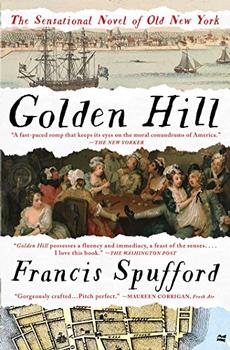Summary | Excerpt | Reading Guide | Reviews | Beyond the book | Read-Alikes | Genres & Themes | Author Bio

A Novel
by Francis SpuffordHere's the big idea of Francis Spufford's Cahokia Jazz: during the Columbian exchange, European colonists, instead of carrying the strain of smallpox that decimated America's Indigenous population, carried a far less virulent strain, Alastrim, that granted immunity upon recovery. A few centuries later, it's 1922, and there remains a visible, mainstream population of Native Americans across the country, marginalized in some places and prosperous in others. Especially prosperous is the ancient city of Cahokia, a hub of industry and culture on the opposite bank of the Mississippi from a tiny town called St. Louis.
The city is majority Indigenous (or takouma in Anopa, Cahokia's lingua franca), with significant populations of Black and white people (taklousa and takata, respectively). Under the watchful eye of the ceremonial-yet-still-formidable takouma monarch, the Man of the Sun, there is something like peace in Cahokia. But the brutal murder of a takata civil servant, staged to look like an Aztec sacrifice, sets off a six-day series of events that pushes the city to its breaking point—and its future may depend upon Joe Barrow, an imposing takouma/taklousa jazz pianist from out of town who works as a homicide detective for the Cahokia police department.
When it comes to alternate history, a compelling scenario only gets you so far. It's impressive to come up with a well-realized setting, one that might have existed had a few metaphorical butterflies not fluttered their wings, but simply describing how this strange new world came to be is not enough: a fascinating history textbook is still a history textbook. What's really impressive is using that setting as a jumping-off point for a cracking great story, the kind of story that turns a bit of bedtime reading into an all-nighter. With Cahokia Jazz, Spufford has done exactly that.
Joe's status as an outsider means he gets exposited to quite often, for the reader's sake as much as his own, but Spufford is careful to explain only what needs explaining. We're told of what's happening elsewhere in America, both good (Reconstruction has been seen through to its conclusion) and bad (there may be a war with Russia over Alaska), but the narrative never loses track of what's really important: the city of Cahokia, its people, and the forces conspiring to tear it apart.
Comparisons to Michael Chabon's The Yiddish Policemen's Union, another alternate history detective novel about a marginalized group with a place of its own, immediately spring to mind. But Chabon's Federal District of Sitka was a bleak place, a tract of slushy Alaskan land populated by despairing, fatalistic Jews preparing for the American government to kick them out forever. Cahokia, by contrast, is a thriving 20th-century metropolis, with streetcars and hot jazz and a hotel designed by Frank Lloyd Wright, and Spufford writes about it with an eye for evocative detail that feels loving even at the city's dirtiest. He describes the fog off the Mississippi as a "billion billion droplets" that were "breathed by the river into the air"; he details "pent-up normality" resuming in the aftermath of a race riot; he writes about a jazz gig at the Algonkian Hotel with such verve you long to travel across time and space to join in.
If I've been vague about the plot, it's only because I want to make sure you go in without preconceived expectations. Suffice it to say, it's an excellent, meat-and-potatoes noir narrative, replete with corrupt cops, manipulative women, powerful men in limousines, and less powerful men in well over their heads. It's colorful, funny, and exciting, with a cynicism that never quite gives way to nihilism. Cahokia is far from a perfect city, it concludes, but it's better than the alternative–a fact to which many of us, in our own world in the year 2024, would attest.
![]() This review was originally published in The BookBrowse Review in March 2024, and has been updated for the
February 2025 edition.
Click here to go to this issue.
This review was originally published in The BookBrowse Review in March 2024, and has been updated for the
February 2025 edition.
Click here to go to this issue.

If you liked Cahokia Jazz, try these:

by Robert Jackson Bennett
Published 2024
A Holmes and Watson–style detective duo take the stage in this fantasy with a mystery twist, from the Edgar-winning, multiple Hugo-nominated Robert Jackson Bennett

by Francis Spufford
Published 2018
Winner of the 2017 Costa First Novel Award.
The spectacular first novel from acclaimed nonfiction author Francis Spufford follows the adventures of a mysterious young man in mid-eighteenth century Manhattan, thirty years before the American Revolution, in "a first-class period entertainment" (The Guardian).
Your guide toexceptional books
BookBrowse seeks out and recommends the best in contemporary fiction and nonfiction—books that not only engage and entertain but also deepen our understanding of ourselves and the world around us.